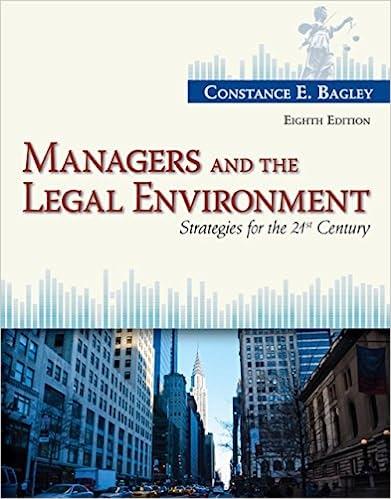Iraq's Ministry of Defense (IMOD) and Wye Oak Technology entered into a contract on August 16, 2004,
Question:
Iraq's Ministry of Defense (IMOD) and Wye Oak Technology entered into a contract on August 16, 2004, for the refurbishment and disposal of Iraqi military equipment. The contract required Wye Oak to "use all reasonable commercial efforts . . . in the development of markets and sales prospects for Military equipment." IMOD agreed to provide offices in Iraq for Wye Oak to facilitate the broker activities, but Wye Oak was "responsible for its own administrative costs." As for compensation, the contract called for IMOD to pay Wye Oak a commission equal to 10% of any sale of equipment and a commission equal to 10% of any refurbishment costs.
The contract required IMOD to make "full payment" of these commissions "immediately upon presentation" to it of invoices by Wye Oak. The contract was signed by Dr. Bruska Noori Shaways, secretary general of IMOD, and Dale C. Stoffel, president of Wye Oak. On the same day the contract was executed, Shaways signed a letter addressed to Stoffel, which stated:
Wye Oak . . . is commissioned as the sole and exclusive agent for the recovery and sale of all Iraqi Ministry of Defense material described as scrap military equipment in the territory of Iraq.
Related thereto, Wye Oak is also commissioned to inventory, assess and recover any such equipment it determines as recoverable for the use or sale on behalf of the Ministry of Defense of the Republic of Iraq.
Less than five months later, Stoffel attended a meeting in Baghdad to discuss contract performance. Three days after the meeting, while still in Iraq, he was shot and killed by unidentified assailants. On July 20, 2009, Wye Oak filed suit against Iraq, but not IMOD, in the U.S. District Court for the Eastern District of Virginia, seeking damages for breach of contract. Iraq moved to dismiss the suit for lack of subject matter jurisdiction, arguing that it was immune from suit under the Foreign Sovereign Immunities Act (FSIA). Wye Oak claimed that there was no immunity because the breach of contract occurred outside the territory of the United States in connection with commercial activity that caused a direct effect on the United States. Who should prevail? What public policies are implicated?
Step by Step Answer:

Managers And The Legal Environment Strategies For The 21st Century
ISBN: 9781285860374
8th Edition
Authors: Constance E. Bagley





